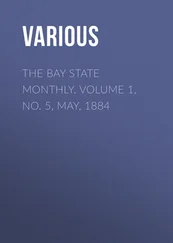Various - The Bay State Monthly, Volume 3, No. 5
Здесь есть возможность читать онлайн «Various - The Bay State Monthly, Volume 3, No. 5» — ознакомительный отрывок электронной книги совершенно бесплатно, а после прочтения отрывка купить полную версию. В некоторых случаях можно слушать аудио, скачать через торрент в формате fb2 и присутствует краткое содержание. Жанр: foreign_antique, periodic, foreign_edu, на английском языке. Описание произведения, (предисловие) а так же отзывы посетителей доступны на портале библиотеки ЛибКат.
- Название:The Bay State Monthly, Volume 3, No. 5
- Автор:
- Жанр:
- Год:неизвестен
- ISBN:нет данных
- Рейтинг книги:5 / 5. Голосов: 1
-
Избранное:Добавить в избранное
- Отзывы:
-
Ваша оценка:
- 100
- 1
- 2
- 3
- 4
- 5
The Bay State Monthly, Volume 3, No. 5: краткое содержание, описание и аннотация
Предлагаем к чтению аннотацию, описание, краткое содержание или предисловие (зависит от того, что написал сам автор книги «The Bay State Monthly, Volume 3, No. 5»). Если вы не нашли необходимую информацию о книге — напишите в комментариях, мы постараемся отыскать её.
The Bay State Monthly, Volume 3, No. 5 — читать онлайн ознакомительный отрывок
Ниже представлен текст книги, разбитый по страницам. Система сохранения места последней прочитанной страницы, позволяет с удобством читать онлайн бесплатно книгу «The Bay State Monthly, Volume 3, No. 5», без необходимости каждый раз заново искать на чём Вы остановились. Поставьте закладку, и сможете в любой момент перейти на страницу, на которой закончили чтение.
Интервал:
Закладка:
REMINISCENCES OF FORTS SUMTER AND MOULTRIE IN 1860-61. By Abner Doubleday, Brevet Major General, U.S.A. 1 vol. 12mo pp. 184. New York, Harper & Brothers.
The author bore an honorable and responsible part in the actual outbreak of hostilities between the national government and the revolted states, and in this book he gives a simple and faithful recital of some of the more important facts. Though so misrepresented by certain critics, the book is not an attack on Major Anderson's character; on the contrary, it clearly shows, and attempts to show, that that commander firmly subdued all considerations and devices which seemed inconsistent with his duty as a soldier of the United States, and held himself ready to be sacrificed to the trust given him. General (then Captain, 1st artillery U.S.A.) Doubleday was at Fort Sumter during the bombardment, and, as might be expected, his volume gives many incidents of the life of the little besieged band, and of the siege itself, which appear here for the first time, and which throw fresh light upon the conduct and principles of both parties to the conflict. As a personal narrative, it is one of the most charming and instructive relating to the war. The book was published in 1876.
ASSESSMENT INSURANCE
It is the purpose of this article to fairly treat the subject under consideration and to set forth such claims only as can be sustained to the satisfaction of candid and unprejudiced minds. It will not be assumed that the science of Assessment Insurance is perfected; on the contrary, our most advanced thinkers upon the subject are those who see most clearly its defects, and are laboring most assiduously to correct them. Grave obstacles have been encountered in their endeavors to perfect the system. Those who have written upon the subject in the public press have been largely such as have given it but a cursory study, or such as have been totally unfit to discuss it from an impartial standpoint by reason of preconceived notions or prejudices in favor of the level premium system of insurance, if, indeed, they have not been retained for a consideration by that gigantic moneyed monopoly.
So largely has prejudice controlled in the consideration of the subject, that those who have sought judicious and stringent legislation to correct abuses, and to bring the business under equally careful and official supervision as that given other forms of insurance, with a view to making it permanently subserve public interests, have been more than once defeated in their laudable endeavors, because they insisted that no legislation could meet the necessities of the case that did not contemplate it as a permanent institution. Great advances have been made however in the last three or four years, and much that was objectionable has been corrected. Wise legislation has been secured in many States. At the last session of her legislature, Massachusetts signalized an important step in advance, by enacting a law whose provisions indicate an intelligent comprehension of the subject on the part of her legislators, unsurpassed by those of any other State. It has already begun to correct existing evils, as its advocates foresaw it would do.
Several companies dishonestly and incompetently conducted have found it impossible to longer prey upon a too confiding public.
The collapse of fraudulent concerns has furnished an occasion for the enemies of the system to cry out against the system itself, but thinking men are not deceived thereby. As was recently remarked by a distinguished ex-insurance Commissioner of Massachusetts, "Assessment Insurance has come to stay." There is not, as has been claimed by its opponents, anything inherent in the system that fore-dooms it to early and inevitable collapse.
Assessment insurance is natural insurance as against artificial. In the early establishment of life insurance companies, everything was assumption, there was little or no experience to guide in formulating the principles upon which the business should be conducted. There was partial information, it is true, upon certain general facts pertaining to longevity or to mortality laws, under certain conditions, but nothing that could give substantial data upon which to base mathematical calculations for the establishment of a science. Under those conditions, rates of premium were fixed for insurance at the different ages which the experience of many years has shown to be very much higher than is required to meet reasonable expenses, and losses occurring from policies maturing by death.
A rate of mortality was assumed greater than experience has shown to prevail among well selected lives. The important element of lapses was not considered, an element so considerable in its practical bearing upon the requirements of the company to meet its liabilities, that of one million of assumed liabilities upon say one thousand lives, only about $77.000 become actual liabilities by reason of policies maturing by death of the insured.
Assessment insurance instructed by the experience of life companies, adjusts its plans and methods upon the natural basis of fact, and not the artificial one of supposition. It tabulates its rates according to the combined experience of all American companies, requiring the insured to pay a sum proportionate to the amount assured, and to his life expectancy.
It places its risks upon carefully selected lives only, requiring a competent medical examination of the applicant, having regard to his previous health and habits, his occupation or profession, his family history, and such other circumstances as should properly be considered in calculating probable longevity.
We assert without fear, that we shall be successfully controverted, that there is as great care and discrimination exercised in the placing of risks by our representation assessment companies, as in any other form of insurance. Time was when this claim could not have been supported by facts, but that time is not now. Our conservative assessment companies,—and there are many of them that can be fairly so styled, ignore none of the scientific principles upon which life insurance depends for its permanent success. They do believe however that their methods of conducting the business will conserve the interests of a far greater number, and relieve them of a large proportion of the burdens imposed by the older and more cumbersome form.
Assessment companies call upon their policy-holders for such sums as are required to meet actual losses, together with a small amount for expenses and for an emergency fund. Mortuary assessments are called only when there is an amount in hand on that account, insufficient to meet the maximum sum for which a policy is issued. They may be called at stated periods, or as the exigencies of the case shall require. Objection is made to this method that it is unreliable, and cannot be depended upon when the mortality is from any cause unusual or excessive.
It is not claimed by the best informed advocates of assessment insurance, that direct assessments should be the sole reliance of the company. Some other provision should be made which is referred to later in this article, but the main dependence is upon assessments.
If companies are honestly and capably conducted, and risks judiciously selected, there is nothing in the experience of life companies to indicate that mortality assessments on the average will be sufficiently burdensome to seriously threaten the permanence of the institution. Where disaster has been visited upon assessment companies, the cause has been easily traceable to incompetent or dishonest conduct of the business, and utter disregard of the foundation principles of all insurance. It has in no instance been fairly chargeable to defects in the system. With the record before us of our best assessment companies, faithfully and competently administered, paying their losses promptly, at a cost to the insured for a term of years, of one third to one half only, of that in level premium companies, what reason is there for the insuring public withdrawing their patronage.
Читать дальшеИнтервал:
Закладка:
Похожие книги на «The Bay State Monthly, Volume 3, No. 5»
Представляем Вашему вниманию похожие книги на «The Bay State Monthly, Volume 3, No. 5» списком для выбора. Мы отобрали схожую по названию и смыслу литературу в надежде предоставить читателям больше вариантов отыскать новые, интересные, ещё непрочитанные произведения.
Обсуждение, отзывы о книге «The Bay State Monthly, Volume 3, No. 5» и просто собственные мнения читателей. Оставьте ваши комментарии, напишите, что Вы думаете о произведении, его смысле или главных героях. Укажите что конкретно понравилось, а что нет, и почему Вы так считаете.












